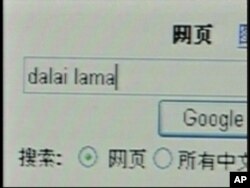It's called the "Enemies of the Internet" list, and it's put out by the organization Reporters Without Borders. On the 2010 list the top three violators of freedom of expression are, in order, China, Vietnam and Iran.
Overall, the report cites 60 nations for at least partially censoring the internet. Examples range from nations like Thailand, which routinely blocks material that may "defame" King Bhumibol Adulyadej, to Germany, which censors websites that deny the Holocaust.
But the biggest offender by far, say report authors, is China, which not only filters and censors the Internet, but has jailed upward of 72 people behind bars for their online activities.
China watcher Michael Horowitz of the Hudson Institute says there is "...a bureacracy of at least fifty thousand people...(all) to ensure the Internet is monitored and censored."
Thousands of people - and billions of dollars - to fortify what's been called the Great Firewall of China. But this wall is not made of stone to keep enemies out. It's made of computer code...and it's designed to keep information from getting in. Information that Chinese authorities consider subversive.
"So if you type up the 'Dalai Lama'," into a Chinese search engine says Horowitz, "you get back a response on google.cn that calls him a crook and a fake and a bad guy."
It was China's censorship demands that compelled the giant search engine Google to leave China, disappointing many of the more than 300 million Internet users in that country.
"If you talk to Chinese activists in China," says the Center for Democracy and Technology's John Morris, "they will tell you that even censored Google had more information than Baidu, which is the leading Chinese search engine."
At present, Google is redirecting users to its servers in Hong Kong where the company will offer uncensored Chinese-language search results. But that site has come under cyber-attack, and Google executives suspect the attacks originated in China with the blessings of Beijing.
Other American computer and internet companies, including Yahoo and Microsoft, remain in China. Several years back, Yahoo actually turned over information that exposed the identity of dissident bloggers. The company said it had no choice, other than leaving the country.
Ginger McCall, with the Electronic Privacy Information Center, notes that Yahoo executives may have had little choice. "In order to operate in China they have to operate by China's laws. China can request those user histories, search histories, emails, all of those things," says Ginger McCall with the Electronic Privacy Information Center, confirming Google's claims.
Yahoo's actions led to the arrest of four dissident Internet activists - sometimes called "netizens" - who remain in Chinese jail, and brought sharp criticism from members of Congress, among them then-Rep. Tom Lantos (D-CA) who, in a 2007 congressional hearing, called Yahoo's activities in China "abhorent...a disgrace."
Clothilde Le Coz, with Reporters Without Borders, says China has the most Internet users behind bars.
"In China you have currently 48 netizens in jail. In Vietnam you have 17 netizens in jail, and it's a country going exactly the same path as China in terms of internet filtering."
In Iran, massive government repression of the Internet did not prevent thousands of protestors from using mobile phones, Twitter and Facebook to express their frustrations over Iran's presidential elections. Clothilde Le Coz says Iranian Internet censors now pay a lot more attention to Facebook.
"The tendency in Iran is if you are on Facebook, you just delete your profile, because it's very dangerous - not only for you but for your friends and the people that you have on your profile."
Iran's government also has an entire bureacracy doing battle with websites like YouTube, Facebook and Twitter. Watching a video on YouTube can take an hour or more as the government tries to make the experience so frustratingly slow that users will stop clicking.
Other nations on the "Enemies of the Internet" list include Saudi Arabia, where about 400,000 websites are blocked. There, as in some other Middle Eastern countries, Internet censorship sometimes has as much to do with culture as it does politics.
Notes Clothilde Le Coz, "A woman in Saudi Arabia cannot access any information on breast cancer because the word 'breast' is in it."
In 2006, the non-profit Global Internet Freedom Consortium was formed to make anti-censorship technologies available around the world. Human rights activists say GIF needs countries like the U.S. to support the growth of these technologies, especially for people in countries such as China and Iran.
The aim of such efforts, says Michael Horowitz, isn't so much tearing down the firewalls, but removing a few bricks at a time. "If you can serve at any given time five percent of the population of a country with access to the Internet, there's so many holes in the firewall there is not a firewall anymore."
Internet censorship is more widespread than just the 12 countries on that Internet enemies list. Reporters Without Borders says even some democracies such as Australia and South Korea have, or will have, too many restrictions on Internet use.





